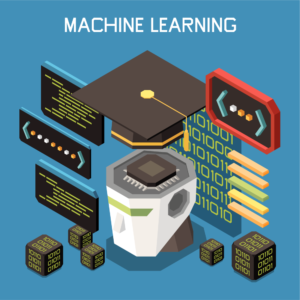Introduction to Machine Learning
Machine Learning (ML) is at the heart of many of today’s technological advancements. From personalized recommendations on streaming platforms to predictive analytics in healthcare, Machine Learning is transforming how we interact with technology and data. But what exactly is Machine Learning, and why is it so important? In this blog post, we will explore the basics of Machine Learning, its different types, and the diverse applications that are shaping the future of various industries.

What is Machine Learning?
Machine Learning is a subset of Artificial Intelligence (AI) that focuses on building systems capable of learning from data. Unlike traditional programming, where a machine follows explicit instructions, Machine Learning enables systems to learn and make decisions based on patterns and insights derived from data. This ability to learn and improve from experience makes Machine Learning an essential tool in data-driven decision-making.
How Does Machine Learning Work?
Machine Learning models are built using algorithms that process and analyze large datasets to identify patterns. These models can then make predictions or decisions without being explicitly programmed to perform a specific task. The more data the model is exposed to, the better it becomes at making accurate predictions.
Types of Machine Learning
Machine Learning can be broadly classified into three main types:
- Supervised Learning:
- In supervised learning, the model is trained on a labeled dataset, where the input data is paired with the correct output. The goal is to learn a mapping from inputs to outputs that can be applied to new, unseen data. Common applications include image recognition, spam detection, and predictive analytics.
- Unsupervised Learning:
- Unsupervised learning involves training a model on data without labeled outputs. The model tries to identify patterns or groupings within the data on its own. This type of learning is often used in clustering, anomaly detection, and market basket analysis.
- Reinforcement Learning:
- In reinforcement learning, the model learns by interacting with its environment. It receives feedback in the form of rewards or penalties and adjusts its actions to maximize the total reward over time. This approach is commonly used in robotics, game playing, and autonomous vehicles.
Applications of Machine Learning
Machine Learning has a wide range of applications across various industries, driving innovation and improving efficiency. Here are some key areas where Machine Learning is making a significant impact:
- Healthcare: Machine Learning is revolutionizing healthcare by enabling early diagnosis, personalized treatment plans, and predictive analytics. ML algorithms can analyze medical images, predict disease outbreaks, and assist in drug discovery. Learn about groundbreaking machine learning applications in healthcare from Stanford University.
- Finance: In the financial sector, Machine Learning is used for fraud detection, algorithmic trading, credit scoring, and personalized financial advice. ML models can process vast amounts of financial data to identify trends and make informed decisions. See how machine learning is being applied to transform the financial services industry.
- Retail: Retailers use Machine Learning to enhance customer experiences through personalized recommendations, inventory management, and demand forecasting. ML-driven analytics help businesses understand consumer behavior and optimize supply chains.
- Marketing: Machine Learning plays a crucial role in digital marketing by enabling targeted advertising, customer segmentation, and sentiment analysis. By analyzing user behavior, ML models can deliver more personalized and effective marketing campaigns.
- Transportation: Machine Learning is at the core of autonomous vehicles, enabling them to navigate, detect obstacles, and make real-time decisions. It also optimizes route planning and traffic management systems.
The Future of Machine Learning
The future of Machine Learning is incredibly promising. As data continues to grow exponentially, the demand for sophisticated ML algorithms and models will only increase. Innovations in areas like deep learning, natural language processing (NLP), and computer vision are set to further expand the capabilities of Machine Learning, making it an indispensable tool across industries.
However, the rapid advancement of Machine Learning also raises important ethical questions, particularly around data privacy, algorithmic bias, and the potential for job displacement. As we continue to push the boundaries of what ML can achieve, it is crucial to ensure that these technologies are developed and deployed responsibly.
Ethical Considerations in Machine Learning
With the growing influence of Machine Learning, it is important to address the ethical challenges it presents:
- Data Privacy: Machine Learning models often require large datasets, which can include sensitive personal information. Ensuring data privacy and security is paramount to maintaining public trust.
- Bias and Fairness: If the training data used in Machine Learning models is biased, the resulting predictions and decisions can also be biased, leading to unfair outcomes. It is essential to develop strategies to identify and mitigate bias in ML systems.
- Job Impact: As Machine Learning automates more tasks, there is concern about its impact on employment. While ML can increase efficiency, it is also important to consider how it will affect the workforce and explore ways to reskill workers for new opportunities.
Conclusion
Machine Learning is a powerful tool that is transforming industries by unlocking the potential of data. From healthcare to finance, ML is driving innovation and improving decision-making processes across the board. Understanding the basics of Machine Learning and its applications is essential for anyone looking to stay ahead in the fast-evolving world of technology.
At computerclimax.com, we are committed to exploring the latest trends and advancements in computing and technology. Stay tuned for more insights into the world of Machine Learning and other emerging technologies.
More to Explore
- Learn how artificial intelligence forms the foundation of machine learning and its applications.
- Explore how machine learning is revolutionizing big data analytics and decision-making processes.
Related
Discover more from Computer Climax
Subscribe to get the latest posts sent to your email.






2 Responses